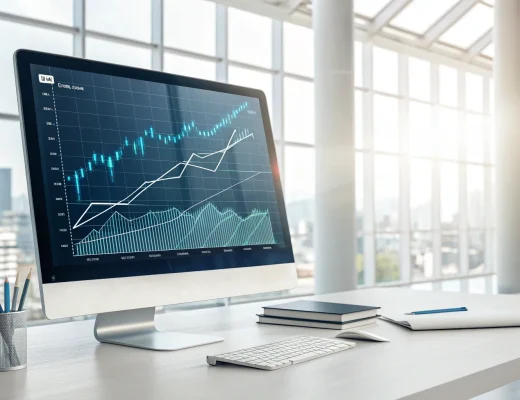As the world’s population continues to grow, the agricultural industry faces a critical challenge: how to sustainably feed nearly 10 billion people by 2050. To address this challenge, new and innovative
technologies are being developed and implemented in the agricultural sector, revolutionizing the industry and paving the way towards a sustainable future. With the adoption of machine learning, artificial intelligence, and IoT-enabled devices, farmers and researchers are optimizing crop growth, monitoring soil health, and efficiently
utilizing water and other resources.
Unmanned Aerial Systems: A New Perspective on Crop Surveillance and Evaluation
One of the most pioneering developments in agricultural technology is the use of advanced drone systems for crop surveillance and evaluation. Equipped with high-resolution cameras and sensors, drones capture crucial data to help farmers make informed choices about crop management. This technology enables more efficient irrigation, pest and disease detection, and fertilizer optimization. Integration of drone data with farming software and data analytics supports the adoption of sustainable farming practices and long-term environmental conservation.
Vertical Farming: Transforming Urban Agriculture
Vertical farming represents another remarkable innovation in sustainable agriculture. This method involves stacking plant layers vertically within controlled environments, enabling crop cultivation in urban areas. Vertical farming offers numerous benefits, including reduced land use, less water consumption, and elimination of traditional challenges such as pests and seasonal fluctuations. In addition to sustainability advantages, vertical farming provides fresher produce to urban populations, reduces transportation-related carbon emissions, and contributes to the fight against climate change.
Precision Agriculture: Data-Driven Decision-Making for Optimal Resource Management
Precision agriculture is a game-changer for modern farming, allowing farmers to harness data to optimize their operations. Utilizing sensors, satellite imagery, and data analysis tools, precision agriculture provides insights into crop health, field conditions, and resource management. This technology enables targeted interventions and fosters sustainable growth, leading to more stable and efficient food production systems for
future generations.
Automation, Robotics, and Artificial Intelligence in Agriculture
The agricultural sector is also benefiting from advancements in automation and robotics. Technologies such as automated tractors, robotic harvesters, and autonomous drones have increased efficiency and reduced labor expenses. Artificial intelligence (AI) in agriculture contributes to farm management optimization through machine learning and predictive analytics, allowing farmers to make data-driven decisions that improve crop yields and reduce waste. IoT devices and smart sensors further enhance decision-making and sustainability by providing real-time monitoring of soil conditions, pest infestations, and weather patterns.
Challenges and Considerations in High-Tech Farming
Despite the numerous benefits, challenges exist in implementing high-tech farming practices. These include potential job displacement and the substantial initial investment required to adopt such technology. To address these issues, the industry must establish training programs to equip farmworkers with the necessary skills and collaborate with government agencies and private organizations to provide financial assistance for small-scale farmers.
Looking Forward: The Future of Agriculture
The agricultural
industry’s future depends on the ongoing evolution and adoption of cutting-edge technologies. By embracing technological advancements, the industry can meet the growing global demand for food while championing a more sustainable and environmentally friendly approach. As technology continues to advance, agriculture will be better equipped to ensure food security and contribute to a healthier ecosystem for generations to come.
Frequently Asked Questions
1. What is the main challenge that the modernization of agriculture aims to address?
The primary challenge is to sustainably feed a growing global population, estimated to reach nearly 10 billion people by 2050, using advanced technologies and innovative approaches in the agricultural sector.
2. How do unmanned aerial systems (drones) contribute to modern agriculture?
Equipped with high-resolution cameras and sensors, drones capture crucial data that helps farmers make informed choices about crop management, such as efficient irrigation, pest and disease detection, and fertilizer optimization. This technology supports the adoption of sustainable farming practices and long-term environmental conservation.
3. What is vertical farming and why is it significant?
Vertical farming is a method of stacking plant layers vertically within controlled environments, enabling crop cultivation in urban areas. It offers numerous benefits, including reduced land use, less water consumption, elimination of traditional challenges, fresher produce for urban populations, and reduced transportation-related carbon emissions, playing a role in combating climate change.
4. How does precision agriculture help optimize resource management?
Utilizing sensors, satellite imagery, and data analysis tools, precision agriculture provides insights into crop health, field conditions, and resource management. This technology enables targeted interventions and fosters sustainable growth, leading to more stable and efficient food production systems for future generations.
5. What roles do automation, robotics, and artificial intelligence play in modern agriculture?
Technologies such as automated tractors, robotic harvesters, and autonomous drones increase efficiency and reduce labor expenses. Artificial intelligence (AI) contributes to farm management optimization through machine learning and predictive analytics, while IoT devices and smart sensors enhance decision-making and sustainability by providing real-time monitoring of various factors influencing crop growth.
6. What are the potential challenges in implementing high-tech farming practices?
Challenges include potential job displacement due to automation and the substantial initial investment required to adopt these technologies. To address these issues, the industry must establish training programs for farmworkers and partner with government agencies and private organizations to provide financial assistance for small-scale farmers.
7. How does technological advancement contribute to the future of agriculture?
Embracing cutting-edge technologies enables the agricultural industry to meet growing global food demand while championing a more sustainable and environmentally friendly approach. As technology continues to advance, agriculture will be better equipped to ensure food security and contribute to a healthier ecosystem for generations to come.
First Reported on: bizjournals.com
Featured Image Credit: Photo by Jahoo Clouseau; Pexels; Thank you!







